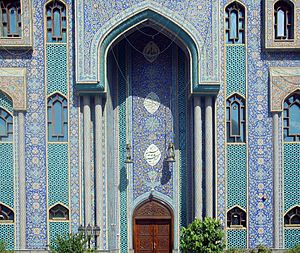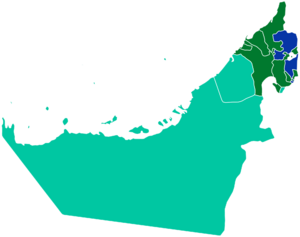Islam in the United Arab Emirates facts for kids
Islam is the official religion of the United Arab Emirates (UAE). About 77% of the people living in the UAE are Muslims, according to a study from 2010. While most Muslims in the UAE are Sunni, a smaller group, less than 20%, are Shia Muslims.
Contents
How Islam Came to the UAE
Islam arrived in the region of the UAE around the year 632 CE. This happened when people sent by the Islamic prophet Muhammad came to the area. After Prophet Muhammad's death, an important battle called the Battle of Dibba took place in Dibba Al-Hisn. In this battle, non-Muslims were defeated, which helped Islam become the main religion in the Arabian Peninsula.
Different parts of the UAE follow different ways of understanding Islamic law, known as schools of thought.
- The Emirate of Abu Dhabi and Emirate of Dubai mostly follow the Sunni Maliki school.
- The emirates of Sharjah, Umm al-Quwain, Ras al-Khaimah, and Ajman follow the Hanbali school.
- The Emirate of Fujairah follows the Shafi'i school.
How Religion is Managed
The government plays a role in managing religious affairs in the UAE.
Mosques and Religious Leaders
The General Authority of Islamic Affairs and Endowments (called Awqaf) is a government group that looks after Sunni mosques. In Dubai, the Islamic Affairs and Charitable Activities Department (IACAD) does this job.
The Awqaf gives weekly guidance to Sunni imams (religious leaders) about what to talk about in their khutbah (weekly talks or sermons). These talks are even posted online. Imams have different levels of freedom in choosing their topics:
- Newer imams follow the script closely.
- Mid-level imams prepare talks based on a topic chosen by the Awqaf.
- Senior imams can choose their own topics.
The government helps fund Sunni mosques and employs all Sunni imams.
Learning About Islam in Schools
In public schools, all students must study Islam. In private schools, Muslim students also have to study Islam. Non-Muslim students in private schools do not have to take these classes. Some private schools that are connected to Christian groups can teach about Christianity or other religions and ethics.
Getting Religious Advice
The Awqaf also runs a service where people can get religious advice, called fatwas. You can call or text them, and the advice is available in Arabic, English, and Urdu. People can ask questions about many topics, like beliefs, business, family, and women's issues. Both male (mufti) and female (muftiya) religious scholars are available to give advice.
Islamic Law in the UAE
For Muslims, Sharia (Islamic law) is an important source for laws. In the UAE, the legal system uses different types of laws depending on the situation. Sharia is mainly used for family matters for Muslims, such as marriage, divorce, and inheritance. However, for non-Muslims or people who are not citizens, the laws of their home country usually apply instead of Sharia.
Shia Muslims in the UAE

The Jaafari Affairs Council manages Shia Muslim affairs across the country. This includes looking after Shia mosques and community activities. The government does not appoint religious leaders for Shia mosques, and Shia mosques are considered private. However, they can ask for and receive funding from the government. Shia mosques are also allowed to broadcast their call to prayer (adhan) from their minarets.
About 5-10% of people from the UAE are Shia Muslims. Many Shia Muslims also live in the UAE who are from other countries, like Iran, Pakistan, and India.
Fasting During Ramadan
During the holy month of Ramadan, Muslims fast from dawn until sunset. This means they do not eat, drink, chew gum, or smoke during these hours. In the UAE, it is against the law to do these things publicly during fasting hours in Ramadan. This rule applies to both Muslims and non-Muslims. If someone does not follow this rule, they might have to pay a fine.
However, there are exceptions for people who cannot fast, such as pregnant women, young children, and people with certain health conditions like diabetes. Some cafes and restaurants stay open during the day in Ramadan, but they have shorter hours and mainly serve non-Muslims or those who are not fasting.
See also
- Religion in the United Arab Emirates
- Islam by country
 | Valerie Thomas |
 | Frederick McKinley Jones |
 | George Edward Alcorn Jr. |
 | Thomas Mensah |


